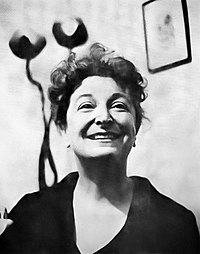Pauline Kael
critica cinematografica statunitense
Pauline Kael (1919 – 2001), critica cinematografica statunitense.

Citazioni di Pauline Kael
modifica- [Su Il lamento sul sentiero] Bello, a volte divertente, e pieno d'amore.[1]
- [Su Gene Wilder] Da isterico qual è, è più divertente di Peter Sellers. Per Sellers l'isteria è solo un'arma in più nel suo arsenale comico — la sua isteria si prende gioco dell'isteria — ma l'isteria di Wilder sembra perfettamente naturale.
- As a hysteric, he's funnier even than Peter Sellers. For Sellers, hysteria is just one more weapon in his comic arsenal — his hysterya mocks hysteria — but Wilder's hysteria seems perfectly natural.[2]
- [Su A qualcuno piace caldo] Esilarante e innocente, sebbene sempre sull'orlo di un doppio senso con effetti disastrosi.[3]
- I pugni in tasca di Marco Bellocchio è probabilmente l’opera d’esordio più sconvolgente della storia del cinema.[4]
- [A Venezia... un dicembre rosso shocking] L'enigma più elegante e meglio montato visto sul grande schermo.[5]
- L'irresponsabilità è parte del piacere di ogni arte; è la parte che le scuole non riconoscono.
- Irresponsibility is part of the pleasure of all art; it is the part the schools cannot recognize.[6]
- Nelle arti, i critici sono le uniche fonti d'informazione indipendenti. Il resto è pubblicità.
- In the arts, the critic is the only independent source of information. The rest is advertising.[7]
- [su Frankenstein Junior] Non è una commedia da dialogo; è più viscerale e bassa. È ciò che viene chiamata una commedia pazza, ed era da anni che non c'era questo tipo di pazzia sullo schermo. È un film da vedere quando il proprio ritmo è rallentato e si è troppo stanchi per pensare.
- It isn't a dialogue comedy; it's visceral and lower. It's what used to be called a crazy comedy, and there hasn't been this kind of craziness on the screen in years. It's a film to go to when your rhythm is slowed down and you're too tired to think.[2]
- Quando ripulisci i film per renderli rispettabili, li uccidi.[6][8]
- Quando vedo quelle pubblicità che dicono «Un film che vorrete vedere due volte!», capisco subito che è quel genere di film che non voglio vedere nemmeno una volta.[9]
- [Su Amanti perduti] Un poema sulla natura e la varietà dell'amore: sacro e profano, altruista e possessivo.[10]
- [Su Settimo velo] Una ricca, portentosa mistura di Beethoven, Chopin, Kitsch e Freud.[11]
- [Su Zero in condotta] Uno dei film più poetici mai realizzati e uno dei più influenti.[12]
Note
modifica- ↑ Da The New Yorker. Citato in AA.VV., Il libro dei film, traduzione di Sonia Sferzi, Gribaudo, 2020, p. 133. ISBN 9788858025864
- ↑ a b Da A magnetic blur, The New Yorker, 30 dicembre 1974, p. 58.
- ↑ Da 5001 nights at the movies, 1982. Citato in AA.VV., Il libro dei film, traduzione di Sonia Sferzi, Gribaudo, 2020, p. 148. ISBN 9788858025864
- ↑ Citato in L'adolescenza e la rabbia, ilcinemaritrovato.it.
- ↑ Da 5001 nights at the movies, 1982. Citato in AA.VV., Il libro dei film, traduzione di Sonia Sferzi, Gribaudo, 2020, p. 213. ISBN 9788858025864
- ↑ a b Da Going Steady, "Trash, Art and the Movies", Marion Boyars, 1969, ISBN 0-714-52976-1.
- ↑ Da Newsweek, 24 dicembre 1973.
- ↑ Citato in AA.VV., Il libro dei film, traduzione di Sonia Sferzi, Gribaudo, 2020, p. 15. ISBN 9788858025864
- ↑ Citato in Portala al cinema, p. 70
- ↑ Da 5001 Nights at the Movies, 1982. Citato in AA.VV., Il libro dei film, traduzione di Sonia Sferzi, Gribaudo, 2020, p. 80. ISBN 9788858025864
- ↑ 1968; citato in Laura, Luisa e Morando Morandini, il Morandini: dizionario dei film 2001, Zanichelli, Bologna, 2000, p. 1210. ISBN 88-08-03105-5
- ↑ Da 5001 Nights at the Movies. Citato in AA.VV., Il libro dei film, traduzione di Sonia Sferzi, Gribaudo, 2020, p. 50. ISBN 9788858025864
Bibliografia
modifica- Portala al cinema (The Moviegoer's Companion, Think Publishing, Londra, 2004), a cura di Rhiannon Guy, traduzione di Luigi Giacone, Einaudi, Torino, 2006. ISBN 8806183044
Altri progetti
modifica- Wikipedia contiene una voce riguardante Pauline Kael
- Commons contiene immagini o altri file su Pauline Kael